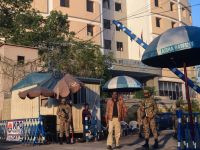(AFP, TEHRAN) - Iranian President Mohammad Khatami called Tuesday for a stabilization of oil prices on the world market in the interests of both producers and consumers, Iranian television reported.
Khatami, meeting with visiting Kuwaiti Oil Minister Sheikh Saud Nasser al-Sabah, emphasized the need for a "rational stabilization of the oil prices so as not to hurt consumers and producers."
The president also expressed Iran's support for the price-controlling methods of the Organization of Petroleum Exporting Countries (OPEC).
Iran's Oil Minsiter Bijan Namdar-Zanganeh, who also took part in the meeting, on Monday reiterated Tehran's opposition to any production increase by the oil cartel.
"In light of OPEC's decisions and notably its mechanism (of controlling oil prices), Iran believes it does not need to increase production," Zanganeh said.
Khatami also spoke Tuesday of Iran-Kuwait ties, saying that regional countries should consult with each other regularly "without the presence and interference of foreigners" to assure regional security and stability.
Sheikh Saud, who arrived Monday for a three-day visit, is expected to discuss the oil markets and OPEC decisions with Iran, along with the demarcation of a disputed maritime area rich in gas and oil.
Iran is involved in a three-way dispute with Kuwait and Saudi Arabia over the demarcation of the border through the northern Gulf continental shelf which includes the Dorra gas field, estimated to contain three to five percent of the world's known gas reserves.
Sheikh Saud's visit to Tehran comes just two weeks after Kuwait and Saudi Arabia reached an agreement on the maritime border between them, seen as essential before any agreement with Iran.
The dispute became urgent when Iran started drilling at the Dorra field earlier this year. It halted the work May 13 after protests by Kuwait, while still maintaining that the field was part of Iranian territory.
Iranian Foreign Minister Kamal Kharazi later told a Saudi newspaper that Tehran was ready for direct talks with Kuwait to resolve the dispute over Dorra and that there were no "fundamental differences."
Earlier this month, Sheikh Sabah said that some of the talks would involve all three parties, while others would be just between Kuwait and Iran.
Kuwait's parliament last week unanimously approved the July 2 border accord with Saudi Arabia, which gave the emirate control over all the uninhabited offshore islands and divided resources equally between the two Gulf Arab allies, while leaving the actual share to be defined once the border with Iran has been demarcated.
Recoverable gas reserves of the Dorra field are estimated at some 21 billion cubic metres (seven trillion cubic feet), with a potential daily output of between 18 and 45 million cubic metres (600 million and 1.5 billion cubic feet.)
© Agence France Presse 2000
© 2000 Mena Report (www.menareport.com)







